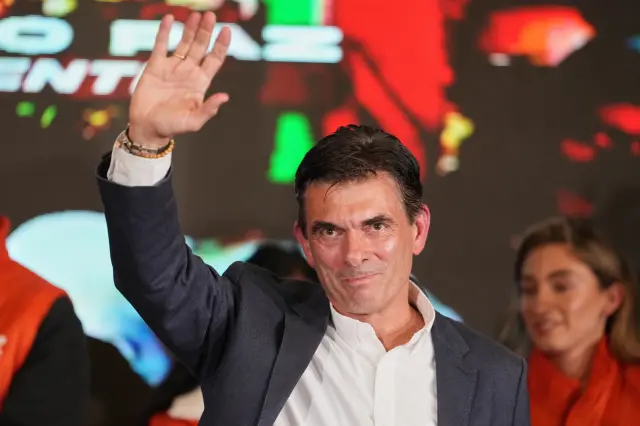-
Palisades fire victims will see building permit fee relief during recovery - 12 mins ago
-
Trump, Changing Course, Throws Harvard Deal Talks Into Chaos - 23 mins ago
-
Tuberculosis outbreak reported at Catholic high school in Bay Area. Cases statewide are climbing - 52 mins ago
-
Mariners Lose 29-Year-Old Veteran Pitcher to Twins - about 1 hour ago
-
Racial Debate Rattles Texas Democratic Primary for Senate - about 1 hour ago
-
Attorneys of man killed by off-duty ICE agent ask A.G. to investigate - 2 hours ago
-
New Mission for a Pro-Business Agency in New York: Fighting for Workers - 2 hours ago
-
L.A. County cuts nearly $200 million in homeless services to close budget gap - 2 hours ago
-
What to Know About the Disappearance of Savannah Guthrie’s Mom, Nancy - 3 hours ago
-
U.S. citizens shot at, dragged by immigration agents, testify before congressional Democrats - 3 hours ago
Rodrigo Paz’s Centrist Victory Ends Bolivia’s 20 Years of Left-Wing Rule
Centrist Senator Rodrigo Paz Pereira won a run-off presidential election in Bolivia on Sunday ending nearly two decades of leftist rule, according to preliminary results.
Paz won 54 percent of the votes to defeat his conservative rival Jorge “Tuto” Quiroga, who won 45 percent, The Associated Press reported, citing early results.
Shortly after the results came in, Quiroga conceded to Paz.
“I’ve called Rodrigo Paz and wished him congratulations,” Quiroga said in a speech. “We need a mature attitude right now.”
Why It Matters
The result reflects deep economic frustration among Bolivia’s 12 million people and heralds a reshaping of the political landscape of South America’s most Indigenous nation. Bolivia is grappling with annual inflation of more than 16 percent and widespread fuel shortages.
The result will also likely trigger significant geopolitical realignment for a country that has for years been allied with Venezuela, China, Russia and Iran.
What To Know
The fragmentation of Bolivia’s once-dominant Movement Toward Socialism (MAS) party, founded by former President Evo Morales, created an opening for opposition candidates. Morales was barred from running because of term limits.
Neither Paz nor Quiroga secured the required majority in an August 17 election, triggering the runoff.
The economic crisis dominated voter concerns, with the country’s natural gas industry collapsing and currency reserves dwindling.
Paz has called for ending Bolivia’s fixed exchange rate, phasing out generous fuel subsidies and reducing public investment but he has said he will take a gradual approach to free-market reforms in the hope of avoiding a sharp recession or ramping up inflation.
Quiroga, who is 65, called for relying on the International Monetary Fund for a shock treatment package of deep spending cuts and privatization.
Paz, 58, and his running mate, ex-police Captain Edman Lara, gained support among working-class and rural voters disillusioned with the free spending of the long-ruling Movement Toward Socialism, or MAS, but wary of Quiroga’s austerity measures.
Both Paz and Quiroga pledged to attract foreign investment to develop Bolivia’s vast lithium reserves, which is crucial for global battery production.
What People Are Saying
Rodrigo Paz told Reuters two days before the election: “We’re going for a new stage of Bolivian democracy in the 21st century “We’re going to try to build an economy for the people…the state is no longer going to be the central axis.”
Captain Edman Lara told supporters after the preliminary results were issued: “We’re grateful to the Bolivian people…It’s time to unite, it’s time to reconcile. Political divisions are over.”
What Happens Next
The new president takes office on November 8.

This article uses reporting by The Associated Press.
Source link








